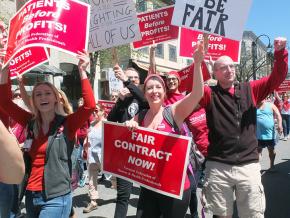UVMMC nurses have the solidarity
reports on a rally of hundreds of union nurses and their supporters on the last day of contract negotiations with the University of Vermont Medical Center.
“THE HOSPITAL wanted us to accept a mediator very early in the game. ‘Why won’t you accept a mediator?’ they asked. ‘You’ve done that every time in the past.’”
University of Vermont Medical Center (UVMMC) primary-care nurse practitioner Tristin Adie was telling a gathering of nearly 300 nurses, family and community members about negotiations with management. Fortunately, Adie said, the administrators got an answer.
“I could’ve kissed her — somebody in the audience said: ‘Because this time, it’s different.’ This time,” Adie said, “we’re not going to let you send someone else so you don’t have to face us directly. This time is different: we have solidarity.”
The nurses’ rally took place on the last day of scheduled contract negotiations — and members of the Vermont Federation of Nurse and Health Professionals (VFNHP) marched together into the bargaining session that was taking place.

The idea that “enough is enough” — that this moment represents a change in attitude, confidence and strategy — was palpable in an event that highlighted the nurses’ successful effort to organize themselves and their community.
Speakers at the rally included union organizers, plus state Sen. Phil Baruth, who has been visiting his mother for the past year while she received treatment at UVMMC. He said:
During that time, because I was working so closely with the nurses, I paid attention to their concerns. And not surprisingly, money was only one of them, and not even the most important. The most important was staffing levels...which takes nurses’ care and makes it difficult to the point where they experience what comes to be called moral distress. A rich hospital like this with nurses experiencing moral distress is an outrage.
“Moral distress” occurs when there is a conflict between a nurse’s current task and ethical compulsions. A nurse may be assigned to one patient, but feels another is receiving inadequate care — something that has become a daily reality due to short-staffing.
Julie MacMillan, a union member and part of the bargaining team, explained the union’s strategy of reaching out to the community.
“All of this is very different than what we’ve done before,” MacMillan said. “The idea is that the community supports our nurses. We felt like if they knew what was happening in our hospitals, they would be as worried as we are.”
Meanwhile, the nurses didn’t settle for a demonstration outside the hospital. Instead, they marched into the auditorium where the contract negotiations were about to end, most clad in red and all chanting, “Safe staffing saves lives.”
The hospital’s representatives left the room through a side exit, leaving a triumphant crowd in their wake. Many nurses were fresh off long shifts and exhausted, but the energy in the room was high as union organizers spoke over the PA.
“They’ve demonstrated that they’re willing to put big investments into the electronic health records, into buildings, expanding the network, buying property...but nothing for nurses,” said MacMillan.
Adie added: “None of this is just UVMMC, none of this is just Vermont, none of this is just Burlington. This is the United States, and this is the problem with this country. The money is there to pay people a livable wage — the money is there to meet our patients’ needs.”
THOUGH THE money is certainly there — the hospital makes millions in profit yearly, despite its nonprofit status — hospital executives did little to take the union’s demands into serious consideration on the last day of scheduled bargaining.
“They didn’t present any more money,” said Patrick Bryant, a member of the union’s negotiation team. “They’ve presented, from our perspective, very minimal money to recognize the work that nurses do here. And today, they made it clear that they won’t discuss a minimum wage of $15.”
The union has pressed for a minimum $15 an hour through the hospital, so that people will be attracted to fill vacant jobs that cause more work for nurses when they go unfilled.
Laurie Anchman, president of the VFNHP, said her priority was increasing staffing — but said that staffing needs wouldn’t be met without increased wages. “With the number of vacancies we have because of our wages, we’re not drawing enough nurses to our area,” Anchman said. “The cost of living in Burlington is prohibitive.”
Before the recession 10 years ago, the hospital used its former CEO’s fraud scandal to explain why it didn’t have money for substantial wage increases. “The following years were the recession, and we were just happy to stay above water,” said MacMillan. “We’re now many years past that, but they’ve continued to say, ‘You swallowed 2 percent last time, what’s the problem?’”
The problem is that 2 percent increases only cover the increased cost of living in Burlington, if that. This puts many nurses in a difficult financial position, including Cheryl Lynn Bodge.
“When they talk strike, I get a little nervous,” she said. “But when I think about it, I can’t afford not to. If that’s the route they take, to help everybody including myself, we’ve got to do what we’ve got to do. We’re trying to provide our community the best care we can, in the safest manner, and we’re just not being given the tools to do that.”
Her attitude is widespread. While VFNHP has yet to take a strike vote, the sentiment seems overwhelmingly on the side of striking rather than allowing the hospital to continue cheating both nurses and patients.
After years of stagnant wages, disrespect from the hospital and having to go to work every day knowing that they could be providing better care to their patients, the nurses have had enough. This time, it really is different.


